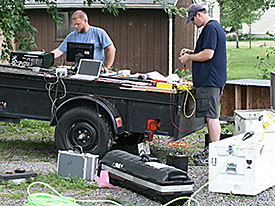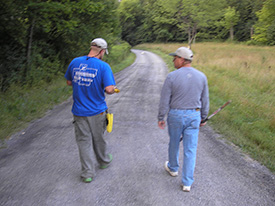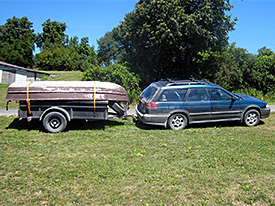
The Lake Ontario Maritime Cultural
Landscape Project
17 September 2007
By Ben Ford
I am now safely back in Texas and should be busily processing the information that we collected over the past few months. Unfortunately, other responsibilities, namely writing a technical report, preparing for my comprehensive examinations, and writing grants for next year’s work, have interceded and I am yet to attack the piles of data cluttering my floor and hard drive. In the meantime you get filler, hopefully interesting filler, but filler nonetheless.
What follows are the eight primary lessons I learned this summer. Some of these lessons occurred to me before I arrived in New York, others I learned by gentle accident, and a few came to me through painful experience. None of these are definite rules, but I hope that they will make someone’s life a little easier.
1) Contact local archaeologists in advance and explain your plans and goals. Talk about cooperative agreements and what you can give back. It’s their house and you’d much rather be a guest than an interloper.

All of this (including the two people) needed to fit into an 18' boat. (large view)
2) Read the manuals before you leave for the field and if the equipment hasn’t been used in recent memory fire it up for a test run. If it was used yesterday, but not by you, a trial is also a good idea. You are dragging expensive electrical equipment through water looking for often ephemeral sites; you don’t want to be the weakest factor in that equation.
3) Get in the newspaper and other local media shortly after arriving in the area. Sell yourself or have somebody else do it. Most people still believe what they read and a positive article will give you credibility and open doors. Folks are much more likely to volunteer information if they know you are coming and what you are interested in. Don’t wait until you find stuff. Potential discoveries are just as interesting to reporters as actual finds and they will come back if you find stuff.
4) Wear school or organization shirts. People will identify you and approach you with information. This tact is much easier than trolling a crowded room searching for the helpful or cooperative needle in the haystack. It also helps if you “look like an archaeologist” – whatever that means. From what I’ve gathered it involves being clean, but not too clean, and occasionally wearing cargo pants.

Walking with an informant to a previously unrecorded site.
5) Act like everything an informant tells you is exciting. Most of it should be, but even if it isn't, the location of a killer site might be one smile away.
6) When speaking with an informant, try to contribute information in return, but don't say too much. This approach will give the impression that you are familiar with local history. However, remember most folks prefer their own version of a story and no one likes a know-it-all. More practically, you want to know what they know more than you want to hear your own voice.
7) Be polite and smile. Wave as you approach, wave at passing cars, don't swear in public. In a small town everyone will know who you are and will generally take great pleasure in retelling your misdeeds. More than representing your institution well, you don't want to damage your chances for future research.

Requiem for the Subaru. Overloading your car like this will cause it to break down in Cleveland, or some other equally inconvenient place.
8) Involve at least one local volunteer, it's like having an ambassador for a best friend. Whether you are conducting interviews, buying gas, or surveying near shore you will likely encounter members of the local populace. A local volunteer can open innumerable doors through inter-community connections. Similar to the newspaper article, these individuals give you instant credibility by their mere presence. Someone who taught your kid gym is much more trustworthy than a want-to-be-"doctor" from the other side of the country. Also remember, you are collecting their history, they should be involved.
Please feel free to contact Ben at ben.ford@iup.edu with any comments, questions, or suggestions during the weeks to come.
Return to Project Journal home page.

